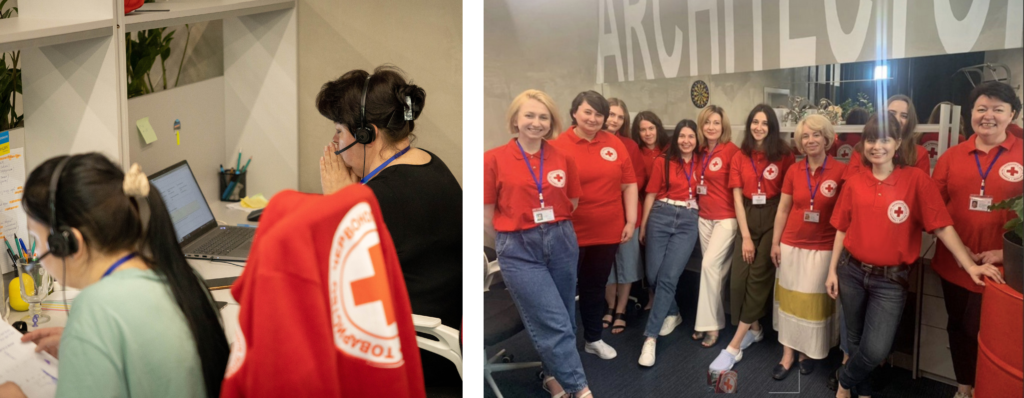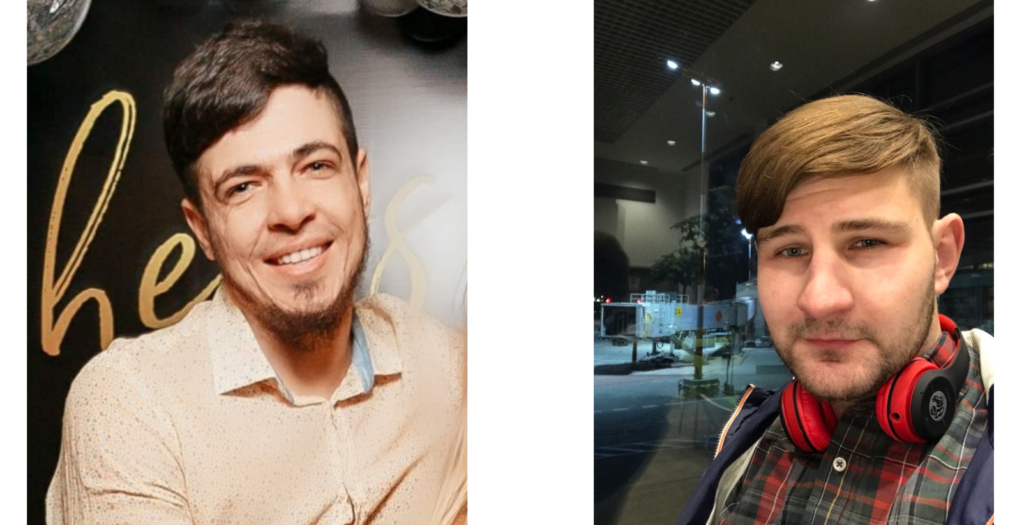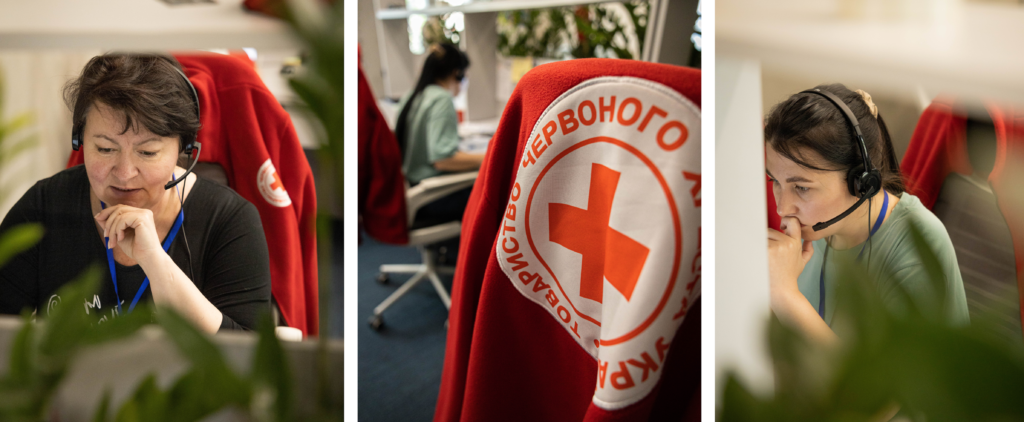Running a nation-wide Information Centre during an Emergency
When there is conflict in a country, emergency responses for the communities need to be put in place quickly. For actors in the field this can lead to new vocations. This has been the experience of Volodymyr Havryiluk and Andriy Maryniak who are running the Ukrainian Red Cross (URCS) Information Center in Lviv, Ukraine. Volodymyr, coordinator of the info center, has a degree in HR and private sector economy. Andriy, deputy coordinator and Vladimir’s right hand-man, studied history and is a teacher by training. When the conflict started all this changed and they stumbled on this new vocation at the URCS.
For Ukrainians in need for information or help, there is a number on the webpage, Facebook and Instagram of the URCS. On the other side of the call, in the background handling the processes, are Volodymyr and Andriy. With patience and understanding of the difficult situations of both the people calling in and the operators, they work tirelessly to make sure that everyone gets the information, humanitarian aid and help that they need.
A Nation-Wide Information Center
The information center is based in western Ukraine, Lviv. Lviv stands at the heart for people seeking shelter during the conflict. The information center is based in western Ukraine, Lviv. Lviv stands at the heart for people seeking shelter during the conflict. However, the night before the interview alarms were heard also here.
The center gets calls from everywhere in Ukraine. They then send the requests to the regional offices. “We try to provide only one phone number, one email address. It’s simpler, so that every part of Ukraine can call one number… It’s very hard to remember five phone numbers – one is easier.” – Andriy explains. People also hear about them through word-to-mouth. Volodymyr and Andriy talks about a time when a call came in from a small town in the eastern region. The regional branch provided them with help and suddenly calls came in from all the small towns in the region because word had spread that the URCS was working and helping.
Before the conflict, there was an existing small-scale information center, originally set-up during the COVID-19 pandemic. With the conflict, the requests increased and the need for help grew drastically. Volodymyr and Andriy assisted in expanding the center. They helped finding a place, rented an office and started working. The center, as it is today, was fully up-and-running on the 3rd of May.
The information center is now operated by 14 people, many of whom are themselves Internally Displaced Persons (IDP’s). They get up to 15-20 000 calls a week. This is a vast number of calls – do they work 24 hours a day? “No”, they respond. The center is open from 8 am to 7 pm. They monitor the peak times to have sufficient capacity then. For now, having night shifts and work during holidays is not a priority – on the contrary – they need to manage all the requests coming in during working hours. They can currently respond to approximately 30 – 50 % of the requests but are in the process of hiring more operators to be able to adequately handle all the calls.

Three departments, four lines
All the calls coming in are divided into three departments depending on the request. The first department is an “ordinary” information hotline, the second is for psychological support and the third one is to Restore Family Links (RFL). Calling the general number, you get directed to the appropriate department. A fourth line that handles the requests coming in through email, messenger, and the chat-bot is recently set up.
Today, most requests concern humanitarian aid – people who lost their homes, who lost everything, get in touch. Internally Displaced Persons (IDPs) ask for temporary shelter, food, and hygiene products. When they return, they may also ask for help to start rebuilding their homes – these requests now come mainly from the Kiev region as people are starting to return there.
Many requests for financial aid also come in– people ask for vouchers and financial support programs. Many have lost their jobs and their income due to the conflict and they need help to be able to support themselves.
They also get many requests to Restore Family Lines (RFL) – there are really many of them, they say. People have lost touch of friends and family during conflict.
Volodymyr and Andriy point out that armed conflict is especially difficult for people with disabilities and older populations and that they get a lot of requests for home care. Knowing how to help is best done through active community engagement.

Community Feedback
This information center, at the heart of the emergency response, is an important community engagement hub in Ukraine. Most operators are IDP’s themselves and have been through traumatizing experiences, which makes them well-placed to understand and respond to the requests of the caller. They handle the requests that come in primarily in Ukrainian but also in Russian. The important thing is that everyone feels comfortable with the language they use.
The center gets information about people’s needs in real time. They can then provide information directly back to those who needs it, but they also collect feedback, conduct analysis, and notify the needs to other branches such as the URCS, IFRC and the ICRC. Getting feedback from the community is immensely important, they say, even just to be able to give the right help to each person.
Right now, for instance, there is a big medical emergency in Ukraine. People need access to both medical services and medicines. It’s difficult to get hold of, for example, high-value cancer medicines. Volodymyr and Andriy puts this into their reports so that other organizations can pick it up and hopefully provide help.
Focus on mental health and feedback sessions
Working in such high-pressure environment demands a lot of feedback sessions. There is a weekly meeting where everyone can bring their questions and they are discussed and processed together. At the beginning of each workday, Volodymyr and Andriy do a 15-minute information session to make sure the operators are up to date before the start of the day.
The center also provides mental health help. If the operator receives a very difficult call there is always a possibility to take some time off, have a break, go for a walk, or just think about it. This is important. They also have operators with a diploma in psychology who can help and give professional support in a critical situation.
This article was written by IFRC’s Minna Guigon-Sell (CEA Communications Consultant)

